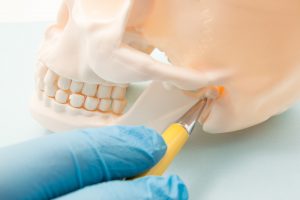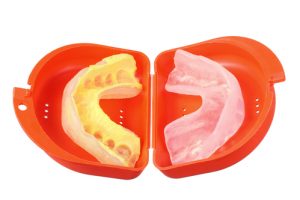According to the National Institute of Dental and Craniofacial Research , as many as 10 million Americans suffer from temporomandibular joint syndrome, or TMJ. Although this condition is often not serious, it can cause pain, and greatly impact the function of a person’s jaw. Learn more about this disorder, what causes it, and exercises to remedy the symptoms.
What is TMJ disorder?
The temporomandibular joint is the joint that connects the jawbone to the skull. It is crucial for speaking, chewing and swallowing. TMJ occurs when the joint is injured, damaged or overused. Symptoms of TMJ often include jaw locking, clicking and popping, which may be heard in the ears. This can contribute to ear pain, temple pain and headaches, and stiff or sore jaw muscles. Symptoms can also range from mild to debilitating, for example, by impeding on a person’s ability to chew and swallow.
What Causes TMJ?
 There are several health conditions that can lead to a person developing TMJ, especially some inflammatory musculoskeletal disorders, like arthritis. Uncontrollable factors that may lead to the disorder are a misaligned jaw, injury to teeth, stress or anxiety, teeth grinding (bruxism), and orthodontic braces. Some lifestyle habits that are known to contribute to TMJ include poor posture, nail biting and excessive gum chewing.
There are several health conditions that can lead to a person developing TMJ, especially some inflammatory musculoskeletal disorders, like arthritis. Uncontrollable factors that may lead to the disorder are a misaligned jaw, injury to teeth, stress or anxiety, teeth grinding (bruxism), and orthodontic braces. Some lifestyle habits that are known to contribute to TMJ include poor posture, nail biting and excessive gum chewing.
TMJ is thought to be mildly preventable by properly managing stress and avoiding habits that may cause damage to the joint. Some self-care to practice is wearing the appropriate safety equipment during sports, and sleeping with a mouth guard. You should also avoid chewing gum, and stick to softer foods that do not stress the jaw or surrounding muscles. Pain associated with TMJ typically starts slowly, therefore the best solution is to see a dental professional as early as possible for diagnosis and treatment.
Treatment
- Relaxed jaw – Gently touch your tongue against the roof of your mouth, just behind your upper front teeth. Relax your jaw, and allow your teeth to come apart.
- Goldfish – Gently touch your tongue to the roof of your mouth. Place a finger in front of your ear where your TMJ is located. Place a pointer finger from the other hand on your chin, applying mild pressure for resistance. Drop your jaw halfway open, and then close. This can also be performed by fully dropping your jaw. Perform this exercise in sets of six, about six times daily.
- Chin tuck – With straight posture, pull your chin straight back, creating a ‘double chin’. Hold for three seconds and repeat up to 10 times.
- Resisted – Place your thumb under your chin, applying slight pressure for resistance. Open your mouth slowly, pressing against your thumb, and holding for three to six seconds before slowly closing your mouth. Similarly, you can hold your chin with light pressure, creating resistance as you close your mouth.
- Jaw movement – Place a ¼-inch object between your teeth. Move your jaw from side to side, eventually increasing the size of the object as the exercise becomes easier. Similarly, place the ¼-inch object, and move your jaw forward and backward, so that your lower teeth are in front of your upper teeth.
 Besides exercises, TMJ is frequently treated with over-the-counter pain relievers, such as ibuprofen and acetaminophen. Muscle relaxers are also common for those in extreme pain. To combat teeth grinding, or to help properly align the jaw, mouth guards can be beneficial. For sore muscles, you may also apply ice and heat in 15-minute intervals. Typically, a combination of these treatments tends to work best, with exercises to assist in rehabilitation. Maintaining healthy habits, including good oral hygiene and posture, are also important. In some extreme cases, surgery ‒ for
dental splints or joint replacement
, may be necessary.
Besides exercises, TMJ is frequently treated with over-the-counter pain relievers, such as ibuprofen and acetaminophen. Muscle relaxers are also common for those in extreme pain. To combat teeth grinding, or to help properly align the jaw, mouth guards can be beneficial. For sore muscles, you may also apply ice and heat in 15-minute intervals. Typically, a combination of these treatments tends to work best, with exercises to assist in rehabilitation. Maintaining healthy habits, including good oral hygiene and posture, are also important. In some extreme cases, surgery ‒ for
dental splints or joint replacement
, may be necessary.
At
24/7 Local Dentist
, our experts will perform a
special examination
to determine if you have a TMJ disorder, and provide the proper medical intervention. If you are suffering from jaw pain,
contact us
or call our office at (833) 220-2448 to schedule an appointment
.










